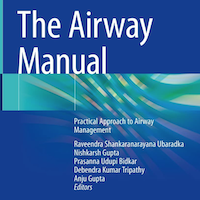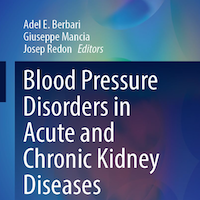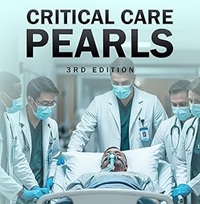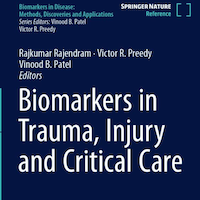Tag: ketamine
Power to the Patient: Rethinking Pain Control in the ICU
This scoping review of 12 relevant studies suggests that Patient-Controlled Analgesia (PCA) offers a promising path toward faster and more stable pain management for ICU patients. By allowing patients to self-administer small... read more
Impact of Low-Dose Ketamine Infusion on Intracranial Pressure and Hemodynamics in Septic Shock Patients
Adult patients with septic shock, on hemodynamic support, had high-to-normal intracranial pressure (ICP). Low-dose continuous ketamine infusion as an adjunct sedative appeared to have favorable outcomes concerning ICP and... read more
Association Between Ketamine Use and Mortality in Critically Ill Patients Receiving Mechanical Ventilation
In this retrospective study, we observed that younger patients with acute respiratory distress syndrome (ARDS) may benefit from ketamine use in terms of 14-day mortality. However, these benefits were not observed in longer-term... read more
Ketamine May Reduce Opioid Requirements Following Cardiac Surgery
Ketamine may be a reasonable choice for postoperative cardiac surgery analgesia and may reduce the need for opioids on discharge, and possibly during admission. This study is a single center, retrospective, observational,... read more
Ketamine for Treatment-Resistant Depression
This book brings together an international group of clinicians and researchers from a broad swath of inter-related disciplines to offer the most up-to-date information about clinical and preclinical research into ketamine... read more

Ketamine Can Be a Transformational Agent But Not Without Risk or Danger
Ketamine is growing as a tool in the world of emergency medicine, offering a broad spectrum of applications that underscore its pivotal role in modern therapeutic regimens. It is increasingly being recognized for its... read more
Early Ketamine Sedation Outcomes Among Mechanically Ventilated COVID-19 Patients
In a diverse sample of U.S. hospitals, about one in 30 patients mechanically ventilated with COVID-19 received ketamine infusions. Early ketamine may have an association with higher hospital mortality, increased total cost,... read more
Safety and efficacy of dexmedetomidine vs ketamine vs midazolam combined with propofol in gastrointestinal endoscopy for cancer patients
In cancer patients who underwent GI endoscopy, dexmedetomidine-propofol and ketamine-propofol had better sedation efficacy [lower achievement time of RSS 3–4, total propofol dose, and eye-opening time] compared to midazolam-propofol... read more
The Ketamine Drive-Through
Patients who present with unexplained urinary tract symptoms or laboratory abnormalities on tests for liver injury should be asked about exposure to ketamine. Patients who chronically use ketamine should also be screened... read more
Acute Effects of Ketamine on ICP in Children With Severe TBI
In this retrospective, exploratory study, intracranial pressure (ICP) did not increase following ketamine administration. In the setting of a guidelines-based protocol, ketamine was associated with a reduction in ICP during... read more
Fear and Insight in the ICU Bed
Mid-morning dressing changes, hours wasted, going through each cut methodically. Dressing off, wound cleaned, redressed. The brunt of pain dealt with by nature before giving in. The intensive care unit (ICU) nurse offers... read more
Why Are We Still Talking about ICP and Ketamine?
A trauma patient required emergent intubation during a recent shift. The altered patient was suspected of having an intracranial bleed. My resident was concerned about rapid onset of hypoxia and other internal injuries causing... read more
The Reemergence of Ketamine for Treatment in Critically Ill Adults
Ketamine has suggested potential benefit in several disease states impacting critically ill patients including pain, alcohol withdrawal syndrome, status epilepticus, and acute agitation. Further supporting evidence is needed... read more
Ketamine vs. Nonketamine Regimens for Analgosedation in the ICU
Results suggest ketamine as an adjunct analgosedative has the potential to reduce opioid exposure in postoperative and MV patients in the ICU. More RCTs are required before recommending routine use of ketamine in select populations. A... read more
Etomidate vs. Ketamine for Emergency Endotracheal Intubation
While the primary outcome of Day 7 survival was greater in patients randomized to ketamine, there was no significant difference in survival by Day 28. A prospective, randomized, open-label, parallel assignment, single-center... read more
Consensus Guidelines on the Use of Intravenous Ketamine Infusions for Acute Pain Management
Evidence supports the use of ketamine for acute pain in a variety of contexts, including as a stand-alone treatment, as an adjunct to opioids, and, to a lesser extent, as an intranasal formulation. Contraindications for... read more
Midazolam and Ketamine Produce Neural Changes in Memory and Pain
Painful stimulation during light sedation with midazolam, but not ketamine, can be accompanied by increased coherence in brain connectivity, even though details are less likely to be recollected as explicit memories. In... read more
Ketamine: A Review of an Established Yet Often Underappreciated Medication
has proven to be a complex medication with unusual properties, heterogeneous, interconnected mechanisms, and diverse, sometimes contested, clinical uses. Ketamine's story begins in 1956 when scientists identified a new... read more
Study Finds Lower Dose of Ketamine Equally Effective in Reducing Pain
Ketamine is known to provide pain relief comparable to opioid medications, which are highly addictive. In the recent study, appearing in the journal Academic Emergency Medicine, researchers studied 98 patients, ages 18 to... read more
Perspectives of Ketamine Use in COVID-19 Patients
Hospitalized coronavirus disease 2019 (COVID-19)-infected patients suffer from both physical impairments and mental stress. Respiratory insufficiency and cardiovascular disturbances require most of the intensive care... read more
Ketamine for PTSD Treatment
Post-traumatic stress disorder (PTSD) continues to be a problematic psychiatric condition that can be difficult to treat. SSRIs are the first-line treatment, and they are the only pharmaceutical class approved – their use... read more
Impact of timing of continuous intravenous anesthetic drug treatment on outcome in refractory status epilepticus
Patients with refractory status epilepticus (RSE) treated with continuous intravenous anesthetic drugs (cIVADs) may benefit from early initiation of such therapy. When cIVADs are applied in RSE, prescribing them early... read more









